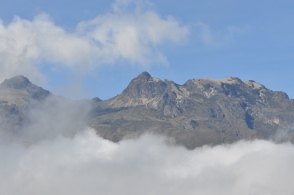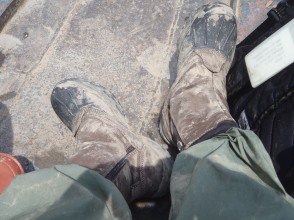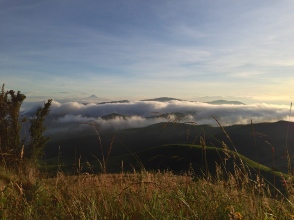Pressures of Ecuador
Act 1: The pressure to keep up
It was 5:00 a.m. and the rain, warm as bathwater, was coming down hard and in giant drops. Thud, thud, thud, on my head, my shoulders, my arms, my back. The drops looked huge in the light emanating from my headlamp. Our group, in single file, walked on the slippery boardwalk over the swamp—a swamp full of anaconda, caiman and piranha.
The unimaginable entered my mind: Right now I’d rather be back at the office doing Powerpoint. No, it didn’t enter my mind. I heard the words come out of my mouth.
Right now I’d rather be back at the office doing Powerpoint.
Who says that? Like, ever?
The rush was necessary but I was failing everyone around me, making the awful journey slower and more arduous than it needed to be. This death march over the swamp would lead us to a boat ramp. We would take a motorized canoe on the Napo River to clay licks where we would see possibly hundreds of parrots and parakeets. But we had to hurry. Parrots and parakeets wouldn’t wait for slow pokes.
Our guide Marcelo was irritated—and he was so far ahead of us I couldn’t even see him. “You need to walk faster,” Steve gently said in my ear. I understood Steve’s concern. I was concerned. We all wanted to get out of this rain storm and I was holding everyone up.
I’m a slow, tentative, short-stride walker with a terrible imagination of the worst happening—because a horrible thing did happen: I slipped on ice and broke my leg while hiking in the snow in Utah’s Zion National Park. Steve had to drag me 800 meters before Search and Rescue got to me. So, I have issues with slipping. And breaking bones. And potentially falling into water with dangerous Amazonian creatures.
I’ve never had vertigo before, but walking on the uneven slippery boards in the dark–even with the aid of a headlamp—unnerved me and made me dizzy. I was convinced that I would land in the water with deadly creatures. Our guide explained that the piranhas were vegetarian and Steve kept telling me that anaconda wouldn’t attack something too large to eat, but it takes more than a few days to undo years of watching Discovery Channel. Plus, no one said anything about the caiman, so I was sure they were setting their table and waiting for me. The more I thought of my eminent death, the more I focused on every step, on every breath, and the more I slowed down.
I held back tears as my frustration grew. I was a let-down to those around me. If I cried maybe I could pretend it was just the rain on my face.
Act 2: The pressure in my head
After a week in the Amazon we continued our birding journey with a week in the high Andes of Ecuador. It was a different tour with a new guide, Jose, and our driver, Manolo. I live in Utah at a high altitude, but I was surprised that after walking only five yards on the flat trail I stopped, grabbed Steve’s arm and said, “I can’t do this. I need to go back and sit in the van.”
The Andes are 6,000 feet higher than where I live in Utah, which is kind of a big deal.
Back I went to the van where I sat wondering what the hell was wrong with me. My head felt squeezed. I struggled for air – this had been a problem earlier in the day when I had an asthma attack from the mold in our hotel room in Quito. Oh, for Pete’s sake, I thought. Is this going to be the rest of the trip for me? Sitting in a bus? Am I overreacting? Am I lazy? Too tired to just walk? I felt stupid. For three hours Steve, Jose, and another birder on our tour, Bill, looked at birds while I sat on a bus with Manolo who spoke no English. I spoke no Spanish. I was bored and frustrated. The shame was overwhelming.
I played solitaire on my iPhone, read a book, and listened to music on my headphones. I slept, as did Manolo, and then Bill showed up.
“Well, that would have been awesome if I hadn’t been puking out my guts,” he said. He went to the back of the van and lay down.
I was secretly grateful to hear that Bill, too, had been suffering from altitude sickness. At least I wasn’t throwing up—and he looked in better shape than me.
It took a few days to get my bearings. The vice on my head let up with each day, but I still struggled. The trails in the Andes were muddy and steep. Every morning I had to navigate my way down a steep, gravely hill. I had walking sticks, boots with great tread, but no confidence. Each step I took was only a few inches, as though any sudden movement would result in an avalanche or rock slide.
People climb freaking Everest and I can’t walk down a stupid little hill, I thought.
I spent a lot of time on the bus with Manolo while Steve, Jose, and Bill found fabulous birds. The ache I gained from this trip wasn’t from hiking; just a sore butt sitting on a minibus. I couldn’t converse with Manolo so I played Scrabble on my iPhone, and read. And then one afternoon that annoying voice in my head said it again: I’d really rather be back at the office working on Powerpoint.
Seriously, how would I explain this to everyone back at home?
Act 3: The pressure to be heroic, or something like that
 I wanted to come home and say, “Oh, it was so awesome! I tested my limits and I didn’t know I could [insert awesomeness here], but I did it!”
I wanted to come home and say, “Oh, it was so awesome! I tested my limits and I didn’t know I could [insert awesomeness here], but I did it!”
I thought that by showing up I could do everything I wanted. I would be some sort of travel hero with stories of canoeing in Anaconda Creek in the Amazon, squirrel monkeys hightailing it across the branches above our heads. I’d have stories of hiking at 14,000 feet in the Andes to see the white water junkie Torrent Duck, or being dive bombed by a dozen angry hummingbirds that were under the impression I was the human responsible for refilling the empty feeders.
The thing is, I did those things. Those were my heroic moments and you can’t capture that in a PowerPoint slide deck.
Charles Dickens once wrote, “One always begins to forgive a place as soon as it’s left behind.”
I now know how to travel to Ecuador. It’s okay to stay back at the lodge (which I finally did one day and had a wonderful tragic moment with a hummingbird). And I know I need to work on getting my hiking confidence mojo back, so I’m working on that.
Look, some people hang out on the beach, reading a novel and are okay with that being their vacation. Me? I choose to go to challenging places, mostly to stalk birds. I’m not perfect at it, but for some reason I want to do it over and over again.
Dickens calls it forgiveness, others call it selective memory. I’m going to call it heroic.
Other posts about this trip
- Birds of Ecuador: The showstoppers!
- NO ONE misses the Birds of Paz de las Aves in Ecuador. Well, except me.
- What to do about that ginormous Birds of Ecuador field guide
- BIrding Antisana feels a lot like Scotland. Yes, really.
- Tips for birders joining an organized tour
- See, taste and experience Otavalo Market (from my other blog, Baby Aspirin Years)
- Picturing Quito (from my other blog, Baby Aspirin Years)
- Angry Hummingbirds
- Come hell or high water: In search of the Torrent Duck
- We’re at bird camp
- Birding high atop the canopy at Sacha Lodge
- It’s elementary my dear Hoatzin
- I held a hummingbird in my hand today
- The tree tomato welcomed me to Ecuador (from my other blog, Baby Aspirin Years)
- The Amazon and Sacha Lodge: Getting there is half the fun (from my other blog, Baby Aspirin Years)



Love the photo of your? boots. Sums it all up.
LikeLike
Yes, those were my boots on that very trek in the rain. Thanks for popping in!
LikeLike
Pingback: Pressures of Ecuador | The baby aspirin years
love it! You are my hero! 🙂
LikeLike
Awww, shucks. Too kind!
LikeLike
You are amazing!
LikeLike
Thanks so much for saying that. It’s taken me several months to get to the point where I didn’t feel so shameful about the trip. It was hard and I’d do it again–just differently. And I’d go into it differently too.
LikeLike
Great post!
Going to Ecuador was a very memorable trip but going there would not have been as much fun without you.
LikeLike
Awww, thanks sweetie. (blushing)
LikeLike
I’m so glad you DO forgive yourself – I can easily imagine the same thing happening to me, and having the same thoughts. Well, I’m doing the vicarious thing here, so more power to you!! Now I should go read about the hummingbird…
LikeLike
Thank you Bluebrightly! Feel free to be vicarious any time. Mi casa su casa.
LikeLike
Pingback: Tips for birders joining an organized tour | The Accidental Birder
Pingback: You can still go birding when you forget your binoculars | The Accidental Birder
Hi there!
I just found your blog via TBEX which I found made interesting reading even though I don’t really know anything about birds! You were brave enough to pin-point your weaknesses, but you still carried on. That’s something to be admired.
LikeLike
Pingback: NO ONE misses the Birds of Paz de las Aves in Ecuador. Well, except me. | The Accidental Birder
Pingback: Birds of Ecuador: The showstoppers! | The Accidental Birder
Pingback: What to do about that ginormous Birds of Ecuador field guide | The Accidental Birder
Pingback: Birding Antisana feels a lot like Scotland. Yes, really. | The Accidental Birder
Pingback: Angry Hummingbirds | The Accidental Birder
Pingback: Come hell or high water: In search of the Torrent Duck | The Accidental Birder
Pingback: We’re at bird camp | The Accidental Birder
Pingback: Birding high atop the canopy at Sacha Lodge | The Accidental Birder
Pingback: It’s Elementary, my dear Hoatzin | The Accidental Birder
Pingback: I held a hummingbird in my hand today | The Accidental Birder
Pingback: Hummingbird love from Ecuador | The Accidental Birder
Pingback: Sometimes wonderful things happen when you stay behind | The Accidental Birder
Great read. Although when I was in Quito I didn’t suffer from any sickness, when I climbed one of the mountains around it I did. As you describe very well you feel crap and when everybody doesn’t suffer then it makes you feel worse!
LikeLike
Pingback: High again | The Accidental Birder
Pingback: Just try and stop me from seeing the Waved Albatross | The Accidental Birder